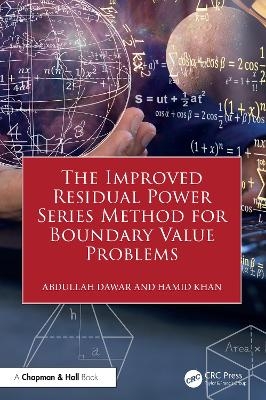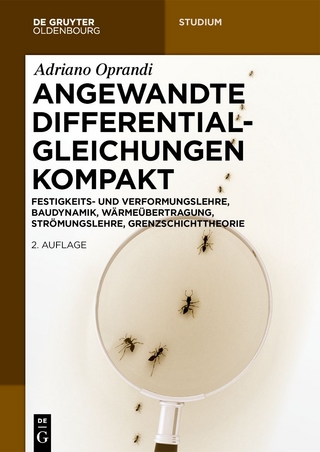
The Improved Residual Power Series Method for Boundary Value Problems
Chapman & Hall/CRC (Verlag)
9781032956541 (ISBN)
This book introduces a semi- analytical method, Improved Residual Power Series Method (IRPSM), for solving boundary value problems (BVPs). Unlike traditional numerical and analytical techniques, IRPSM offers quick convergence and minimal computational time, avoiding the pitfalls of round- off errors, linearization, perturbation, and discretization. This innovative approach has been rigorously compared with existing methods, demonstrating superior accuracy and efficiency. The book is meant for scholars, researchers, and students in mathematics, engineering, and physics.
This book:
Explores the application of IRPSM to a wide range of problems, including ordinary and partial differential equations, multi- point BVPs, and complex systems in physics and engineering
Highlights IRPSM for its ability to efficiently handle highly nonlinear and complex boundary value problems, providing accurate solutions with reduced computational effort
Demonstrates the method’s applicability across disciplines such as fluid dynamics and engineering
Provides Mathematica codes for each solved problem, allowing readers to understand the solution procedure and implement IRPSM in their own research
Offers a new and efficient method for solving BVPs and a practical reference for those seeking to minimize computational time and error in their work.
Dr. Abdullah Dawar earned his BS degree from Islamia College University, Peshawar, Pakistan, his MS degree from Qurtuba University of Science and Information Technology, Peshawar, Pakistan, and his PhD degree from Abdul Wali Khan University, Mardan, Pakistan. He has over 80 research articles published in well-reputed journals. His expertise spans topics including magnetohydrodynamic, nanofluids, hybrid nanofluids, mathematical modeling, numerical and analytical methods, computational fluid dynamics, and heat and mass transfer problems. Currently, he is pioneering research on a novel methodology known as the Improved Residual Power Series Method (IRPSM). This innovative approach aims to enhance the accuracy and efficiency of solving differential equations and fluid flow problems, further advancing the field of computational and theoretical fluid dynamics. Prof. Dr. Hamid Khan received his bachelor's degree from the Government postgraduate college Mardan and his MS degree from Kohat University of Science and Technology, Kohat. His MS research work was on Matrix Inversion and the Solution of a system of linear equations. During his MS, he wrote two research articles from his work and visited Japan to present his work in IPS Program at Saga University Japan. He discussed in detail his own research theme ( Matrix Inversion and Solution of system of linear equations) with Prof Minamuto Teruyu (Department of Information Science Saga University Japan) and Prof Okazaki Yoshiaki (Kyushu Institute of Technology (KIT)). He gave two lectures on his own research theme to Professors and their research students at Saga University Japan. He is currently an Associate professor at the Department of Mathematics, Islamia College University Peshawar, Pakistan. Hamid Khan received his Ph.D. degree from Islamia college university Peshawar in 2013. He has published more than 43 research articles in well-reputed journals during his career. He also produced 7 Ph.Ds. and 16 MS students. Most of his research is on solving differential equations using the series solution techniques. He is working on a new method called the Improved Residual Power Series Method (IRPSM). He worked with serval MS and Ph.D. students on IRSPM. He published two research articles and submitted more than seven research articles based on the IRPSM technique.
1. Basic Idea of the Improved Residual Power Series Method 2. IRPSM for the Solution of Two- and Multi-Points Boundary Value Problems 3. IRPSM for the Solution of Partial Differential Equations with Boundary Value Problems 4. IRPSM for the Solution of System of ODEs and PDEs with Boundary Value Problems 5. Application of IRPSM for Singularly Perturbed and Singularly Perturbed Delay Differential Equations 6. IRPSM for Heat Transfer Boundary Value Problems 7. IRPSM for Finite Boundary Value Problems in Fluid Dynamics
| Erscheinungsdatum | 24.04.2025 |
|---|---|
| Zusatzinfo | 62 Tables, black and white; 100 Line drawings, black and white; 100 Illustrations, black and white |
| Sprache | englisch |
| Maße | 156 x 234 mm |
| Gewicht | 520 g |
| Themenwelt | Mathematik / Informatik ► Mathematik ► Analysis |
| Mathematik / Informatik ► Mathematik ► Angewandte Mathematik | |
| Naturwissenschaften ► Physik / Astronomie ► Strömungsmechanik | |
| ISBN-13 | 9781032956541 / 9781032956541 |
| Zustand | Neuware |
| Informationen gemäß Produktsicherheitsverordnung (GPSR) | |
| Haben Sie eine Frage zum Produkt? |
aus dem Bereich


